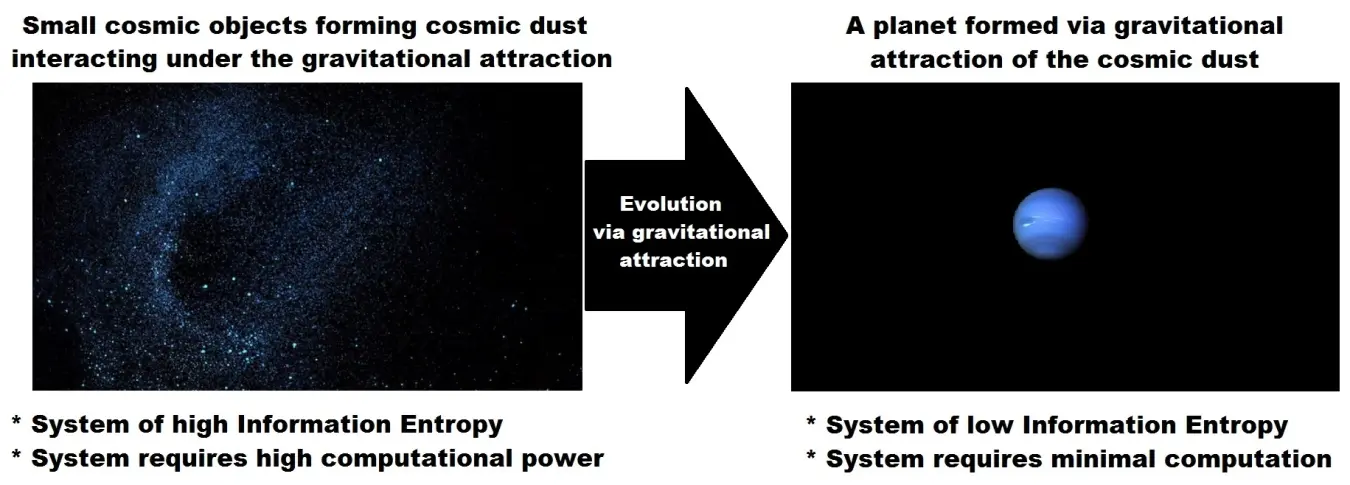An Associate Professor in Physics at the University of Portsmouth in the UK believes that gravity could be explained by information-reducing processes inside a computational or simulated universe.
Dr Melvin Vopson has made headlines in recent years for some pretty “huge if true” suggestions about the nature of the universe, claiming to have found (tentative) evidence supporting the hypothesis that the universe is in fact a simulation. In one particularly eyebrow-raising paper, Vopson claimed to have found such evidence while studying the evolution of the SARS-CoV-2 virus responsible for COVID-19.
In a new paper, he outlines why he believes that gravity could also be a sign we are living in a computational universe. It all stems from a concept of entropy in information theory, a respected and sometimes incredibly useful way of studying the universe. Though similar to plain old entropy, information entropy is distinct.
“The physical entropy of a given system is a measure of all its possible physical microstates compatible with the macrostate,” Vopson explained in a previous paper. “This is a characteristic of the non-information bearing microstates within the system. Assuming the same system, and assuming that one is able to create N information states within the same physical system (for example, by writing digital bits in it), the effect of creating a number of N information states is to form N additional information microstates superimposed onto the existing physical microstates. These additional microstates are information bearing states, and the additional entropy associated with them is called the entropy of information.”
While entropy tends to increase over time, information entropy tends to decrease, according to Vopson, who terms this rule the “second law of infodynamics”. An illustration of this would be the heat death of the universe, where the universe reaches a state of thermal equilibrium. At this point, entropy has reached its maximum value, but not information entropy. At this heat death (or just before), the range in temperatures and possible states in any area of the universe is very small, meaning that fewer events are possible and less information can be superimposed, making information entropy lower.
“Since the second law of infodynamics is a cosmological necessity, and appears to apply everywhere in the same way, it could be concluded that this indicates that the entire universe appears to be a simulated construct or a giant computer,” Vopson explained in a piece for The Conversation.
“A super complex universe like ours, if it were a simulation, would require a built-in data optimisation and compression in order to reduce the computational power and the data storage requirements to run the simulation. This is exactly what we are observing all around us, including in digital data, biological systems, mathematical symmetries and the entire universe.”
In his new paper, Vopson focuses on gravity. Like with biological systems and symmetries, he proposes that gravity could be a way the universe minimizes information, and saves on computational power.
“My findings in this study fit with the thought that the universe might work like a giant computer, or our reality is a simulated construct,” Vopson explained in a statement. “Just like computers try to save space and run more efficiently, the universe might be doing the same. It’s a new way to think about gravity – not just as a pull, but as something that happens when the universe is trying to stay organized.”
In the work, Vopson proposes that gravity arises from entropic forces. Essentially, moving several objects close together via gravity reduces the amount of computational power to describe the whole system.
“Put simply, it is far more computationally effective to track and compute the location and momentum of a single object in space, than numerous objects. Therefore, it appears that the gravitational attraction is just another optimizing mechanism in a computational process that has the role to compress information,” Vopson said.

The planet would take less computational power to simulate.
“By deriving Newton’s law of gravity from information-theoretic considerations, this work supports the view that gravitational attraction arises due to a fundamental drive to reduce information entropy in the universe,” he added in the paper.
“Whether the universe is indeed a computational construct remains an open question, but the entropic nature of gravity provides compelling evidence that information is a fundamental component of physical reality and data compression drives physical processes in the universe. Future research should focus on refining this framework, exploring its applicability in relativistic and quantum gravitational contexts, and investigating possible experimental validations.”
While simulation theory has become popular during the age of computers, this work does not appear to offer up much in the way of intriguing evidence, nor avenues of scientific investigation. It also suffers from the same philosophical flaws of all simulation arguments, pushing the “real” laws of physics into the “base” reality. Physicists have been working hard for centuries to understand gravity, and “it’s because we’re simulated” seems an unsatisfying and unscientific answer to the question. That isn’t to say that it isn’t impossible, but if we were stuck in a simulation it may be impossible to tell from within it, let alone escape.
The study is published in AIP Advances.
Source Link: "Optimizing Mechanism": Physicist Claims Gravity Is Evidence We May Be In A Simulation